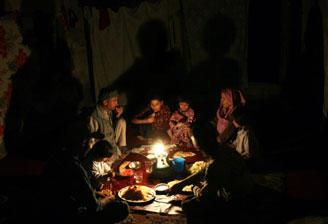RASC News Agency: In Kabul, despair is mounting as residents endure prolonged blackouts while receiving electricity bills that have multiplied several times over. Families complain that despite spending entire days and nights without power, their monthly invoices arrive inflated, bearing no relation to actual consumption. For many, this is not mere mismanagement but deliberate exploitation under Taliban rule, where the state-run utility, Da Afghanistan Breshna Sherkat (DABS), has become a tool of financial coercion. Residents describe a grim pattern: power flickers on for mere minutes before vanishing again, yet bills reflect rates higher than ever before. “We live in darkness most of the month so where do these massive charges come from?” one Kabul citizen asked angrily. Many say that being forced to pay for services never delivered is not only unjust but tantamount to extortion. Families already struggling with unemployment and poverty now face the impossible choice between buying food or paying Taliban-enforced electricity dues.
Civil activists and experts argue that opacity within the Taliban-controlled utility system has institutionalized corruption, enabling inflated billing and the siphoning of revenues into the pockets of commanders rather than public infrastructure. At the same time, Afghanistan’s fragile power grid remains neglected, with no genuine investment in production or transmission capacity. The result is a double crisis: citizens deprived of electricity while simultaneously forced to fund a predatory system that deepens their misery. Despite this reality, the Taliban continue to stage grandiose media spectacles, signing contracts and announcing multi-megawatt energy projects in Logar, Kabul, and beyond. Over the past two years, officials have paraded before cameras, trumpeting plans for solar plants and nationwide electrification. Yet the lived experience of Kabulis reveals the truth: endless blackouts persist, bills remain extortionate, and promises dissolve into propaganda.
Economic analysts insist that the Taliban’s actions expose their priorities with clarity: the regime is less concerned with governance and service delivery than with extracting revenue and projecting a false image of competence to the public and international donors. Instead of building sustainable systems, Taliban leaders exploit electricity as another instrument of control and profit, weaponizing a basic necessity to tighten their grip on society. Experts warn that this model of governance propaganda masking predation is unsustainable and dangerous. By denying citizens reliable electricity while exploiting them financially, the Taliban are fuelling resentment that will only intensify over time. For ordinary Afghanistani families, the daily reality is unambiguous: under the Taliban, they are robbed in darkness, silenced by propaganda, and left to shoulder the heavy costs of corruption and failure.






